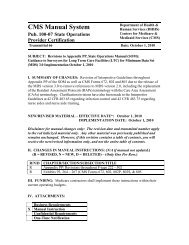LOUISIANA Community Mental Health Services Block Grant ...
LOUISIANA Community Mental Health Services Block Grant ...
LOUISIANA Community Mental Health Services Block Grant ...
You also want an ePaper? Increase the reach of your titles
YUMPU automatically turns print PDFs into web optimized ePapers that Google loves.
expected to be the foundation for promoting better integration at the clinical level. In several areas<br />
throughout Louisiana, local clinics have independently reorganized their services into a more<br />
integrated model. Many of the local areas have embraced evidence-based practices and have<br />
recognized that integrated care should be the standard. Local areas have also acknowledged the cost<br />
savings that occurs with integrated care; this is particularly inviting given the state‟s economic<br />
problems.<br />
Adequate, safe, and affordable housing, already a problem in the state, became a major obstacle after<br />
the 2005 hurricanes, and to a lesser, but significant degree after the 2008 hurricanes. Serious mental<br />
illness and substance abuse continue to be the two most significant factors contributing to<br />
homelessness in the State. There is a lack of affordable housing, especially for people with<br />
disabilities. The need for rental subsidies to assist people with disabilities who are homeless due to<br />
the skyrocketing of housing costs is evident. The decrease in FEMA-funded housing has again put<br />
people into the homeless category who were housed in motels and trailers for several years after<br />
Hurricanes Katrina/ Rita. Aside from the dire need to create a new stock of affordable housing to<br />
replace that lost in the hurricanes, there is a considerable need for community based support services<br />
to assist people with mental illness in attaining and retaining their housing. At a minimum, an<br />
increase in available outreach programs, such as those provided through the Projects to Assist in the<br />
Transition from Homelessness (PATH), that include assessments, stabilization and preliminary<br />
treatment services, transportation, and advocacy is needed. Easy availability to resource centers for<br />
use as address and telephone communication sites are also needed. Funding through the PATH<br />
program of CMHS is targeted specifically towards those homeless persons with severe mental illness<br />
and/or severe mental illness with a co-occurring disorder.<br />
The availability of a statewide system of Strengths Based Case Management would be a significant<br />
improvement in the quality of community based supports available to persons with mental illness.<br />
Efforts to increase available and appropriate housing for persons with mental illness through training<br />
and recruitment of housing providers, increased access to existing housing stock, and expansion of<br />
resources for housing development and support services continues. OBH and mental health<br />
advocates have been extremely active in efforts to insure that people with disabilities are included in<br />
housing and rebuilding efforts. These efforts have resulted in some success; for instance, the<br />
commitment to the development of 3,000 units of permanent supportive housing. Permanent<br />
supportive housing is a best practice and offers the greatest degree of consumer choice.<br />
A lack of appropriate education directly impacts the ability of adults and youth with mental health<br />
disorders to find employment, and these individuals are oftentimes unemployed and underemployed.<br />
OBH remains invested in providing school-based mental health and health-related services in<br />
academic settings. OBH has a Memorandum of Understanding with the Special School District #1 of<br />
the Department of Education to provide educational services to children and youth hospitalized in an<br />
OBH facility.<br />
Educational services are also offered through the Early Childhood Supports and <strong>Services</strong> program<br />
(ECSS) - located in CAHSD, MHSD, FPHSA as well as Regions 3, 4, 7, and 8 and Louisiana Youth<br />
Enhancement <strong>Services</strong> (LaYES - located in MHSD). <strong>Services</strong> offered that improve parent- child<br />
relations, who assist students with job-related skills, such as social skills, safety practices in the work<br />
place, and a broad range of issues related to behavioral, emotional, and mental health that are<br />
fundamental to adolescent development and educational attainment. Referrals are routinely made to<br />
assist youth maintain their educational goals, by the the <strong>Mental</strong> <strong>Health</strong> Rehabilitation (MHR)<br />
PART C <strong>LOUISIANA</strong> FY 2011 PAGE 75<br />
SECTION II: ADULT & CHILD/ YOUTH<br />
IDENTIFICATION & ANALYSIS OF SERVICE SYSTEM’S STRENGTHS, NEEDS, & PRIORITIES<br />
UNMET SERVICE NEEDS & PLANS TO ADDRESS UNMET NEEDS
















